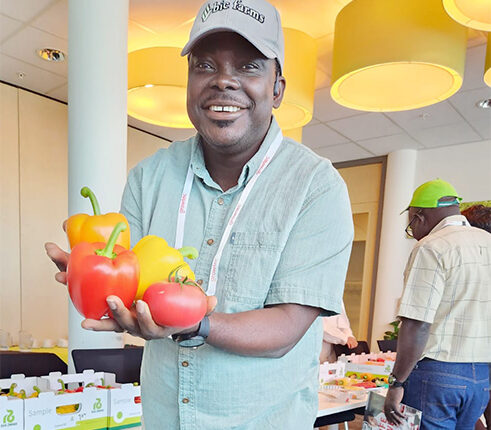Green Skills Key To Transitioning From Brown To Green Economy – Onafowora
CHIGOZIE AMADI
Adebowale Onafowora, Founder and Managing Director of BIC Farms, a foremost hydroponic technology organisation, in this interview with SEYI TAIWO-OGUNTUASE, speaks on the needed skills for transitioning from a brown economy to a green economy among other salient issues. Excerpts.
BIC farms recently introduced a special kind of drip irrigation system, can you tell us about it?
We just introduced another technology into the Nigeria horticultural space and that is called the Irigreen subsurface drip irrigation system.
Most irrigation systems around are surface drip irrigation and they have certain limitations. For example, some are just 30cm wide from one meeting point to another, some are 50cm but they have an issue of clogging and then the material used to produce them is not so durable, so you can only use them for one cycle or at most two cycles you have to remove them, ultraviolet radiation affect them.
The Irigreen sub-surface drip irrigation system can last for a minimum of five years, and then it is installed at subsurface level under the soil which we call the rhizosphere.
What happens when you install irrigation at this level, the root of the plant is directly impacted by both water and nutrients so you spend less on water, it reduces evaporation, and it does not get clogged, which is a major problem with irrigation.
With no pressure, you are releasing nutrients into the soil, so your plant grows better, and faster and you get the kind of yield that other drip irrigation systems do not give you.
The good part is that it is an African innovation, invented in Algeria but we are their partner and exclusively available to BIC farms in Nigeria. Currently, we are promoting it and pushing it to farmers; soy farmers, maize farmers, tomato farmers, cucumber, pepper, and then for greenhouse purposes in the substrates and in the soil.
These are amazing materials that help farmers. We teach people what we call green skills. That is the skill needed for this time as we are transitioning from a brown economy to a green economy.
BIC farms is training a lot of people. We have two major programmes, one is the Graduate Agripreneurship Apprentice Programme (GAAP).
We designed this programme four years ago; we take graduates from Nigeria’s universities and polytechnics and train them specifically to manage technology-based farms.
It’s a six-month course, paid internship and it’s paying off handsomely. IITA and IFAD saw this course they approached us to design one for youths, so we now designed the one we called the Youth Agripreneurship Apprentice Programme (YAAP), it’s a three-month free paid programme, we take in young people within the ages of 19 and 35, we train them for three months and they are paid a stipend to become farm managers, especially greenhouse and orchard managers.
These are some of the things we are currently doing in the Nigerian agricultural space.
Talking about the Irigreen technology, how affordable is it to an average Nigerian farmer?
Currently, I will say it is a very affordable tool, when we are talking about affordability we need to look at so many things.
Sometimes what we do in agriculture is penny wise pound foolish, people buy irrigation systems that are not so durable, that do not even give them all the results they want.
This irrigation system lasts for five to eight years. If by accident somebody sets fire on your farm your drip will still be intact, when this drip is done it is made from recyclable material, it also recycles into the soil, smoothly and nicely, these are some of the benefits.
When it comes to pricing, it is very affordable. For one plot you need about 400metres which is just N80, 000 which is the introductory price, because of forex but we are still on that level.
When you divide that amount for the lifespan of this irrigation, let’s say five years divided by N80, 000 just imagine the cost per year, so it’s something very affordable.
How are Nigerians embarrassing this new technology?
Currently, certain Nigerians are excited about it, we are trying to let them know more about it because it’s good for soil-based farming. If you are growing maize, or soya, even when you develop an orchard, farmers are accepting it gradually.
A lot of greenhouse farmers are accepting it, farmers who are growing avocados, oranges, bananas, and plantain are taking it and maize farmers are also taking it.
Another thing I want to say about this drip irrigation is that there is a plant called alfalfa, it is a very good plant for ruminants.
When you plant it, and it’s fruiting, it starts to be harvested after two months, but the moment you start harvesting you will be harvesting it every month for the next five to seven years, all it needs is water.
So, with this drip irrigation in your soil, wherever you are planting your alfalfa you have permanent access to wealth and you will just be harvesting, so it makes ranching a done deal.
How do you set up this kind of irrigation system, Is your farm set up for whoever buys or the farmers can do it by themselves?
It’s a two-way thing, it can be a do-it-yourself thing, we have instructions on how they can install it, they just get the drip and attach it, and we also install it for people.
We are also training some young people to understand its functionality, so if somebody has a big job, all you need to do is to get in touch with them which we can connect you with to help you install.
Will you say that the Nigerian youths are now interested in agriculture, and if you are to rate their interest, what will it be?
In the last 10 years, Nigerian youths’ interest in agriculture has changed seriously.
We used to be scared about who would feed our future when the average age of a farmer in Nigeria is 60 and the average age of a Nigerian is 22, but today because of the style of agriculture a lot of young people are running into it, so I can tell you with excitement young people are getting interested in agriculture because of the style of agriculture we are promoting.
There is something we also do, we help Nigerians in the diaspora get started in agriculture.
Many of them have been worried about who will build our farms, and who will train our farm managers, and currently, we help them.
There is something about our technology, on one hectare of our greenhouse hydroponic farm, we harvest what you need 50 hectare of land to grow, so it’s helping people to be able to grow food without being scared.
BIC Farms is a hydroponic technology organization, can yohed more light on what you do?
Our organization builds tropical greenhouses suitable to the Nigeria and African climate and we have innovation in growing vertically and then growing any type of vegetables but with localised technology.
What do I mean by that, we are not using the type of hydroponic system they are using abroad, we innovated the ones that are locally suitable for our people; sustainable, cheap, and affordable and then we have found a way to use local waste materials; we have recycled them into production.
We use materials like rice husk; if you go to where rice is being grown and processed in many areas in Nigeria today, rice husk is now a commodity because we turn that into substrate, we also process it into biochar, a sort of powdered charcoal. From that rice husk, we have something called a growing mix that you grow vegetables with, it helps vegetables to grow in a disease-free environment they grow faster and they are better.
In BIC farms we build greenhouses, we build climate-controlled but tropical-based and focus greenhouses, we do consulting for agribusiness management, and we produce something called substrate, substrate is what you grow crops in. We also build hydroponic systems, and home gardens for both commercial and personal use.
Then we do training, currently we have trained over 40,000 youths. We do a lot of training, we have the monthly master class that we call the Maximise Agribusiness Master class, and we have the Youth Agripreneurship Apprentice Programme (YAAP) and Graduate Agripreneurship Apprentice Programme (GAAP).





















